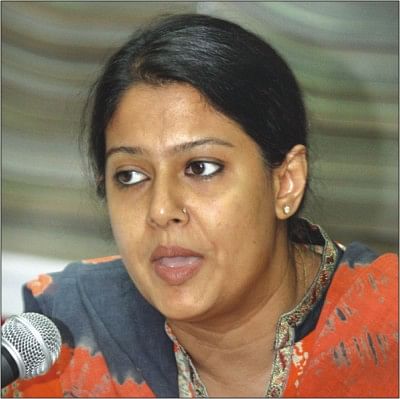<i>Time names Rizwana as environment hero</i>

Syeda Rizwana Hasan
A Bangladeshi environmentalist has featured in the October issue of the prestigious US magazine Time in recognition of her outstanding contribution to the protection of the environment, particularly in the ship-breaking yards.
Syeda Rizwana Hasan, executive director of Bangladesh Environmental Lawyers Association (Bela), appeared in Time's 'Heroes of the Environment 2009' for her activism for the protection of ship-breaking workers and the environment.
She appeared among seven from across the world under the Time's activists category.
The Time report on Rizwana reads: "Every morning on the beaches of Chittagong, some 15,000 men go to work knowing that they could die that day.
"For 16-hour shifts, workers in Bangladesh's largest ship-breaking zone are sent with little protection or guidance into other nations' aging vessels to pull their hulls apart by hand.
"Inside the ships they face a haze of thick, black smoke from the torches used to cut the metal, unstable gases, asbestos, lead and mercury.
"Rizwana is one of the few advocates for these men -- and the beaches where the contaminated ships end up. She has struggled to bring better environmental and labour regulations to Bangladesh's 36 ship-breaking yards.
"Ship-breakers are killed every day by the explosions, fires, or falling metal of South Asia's shipyards.
"While the 150 or so ships that go through Bangladesh's yards every year, labour and environmental laws remain mostly in papers, with the international guidelines against toxic waste-dumping are seldom met."
Rizwana won a couple of legal battle against dismantling of scrap vessels without carrying out decontamination.
A quarter of Bangladesh's ship-breaking workforce is under the legal working age of 18, says Time, quoting Muhammed Ali Shahin of the Brussels-based NGO Platform on Ship-breaking.
Aged ships laden with toxic substances are often brought from European countries to Bangladesh for dismantling without decontamination.
It is a recognition that lends credibility at both personal and organisational levels, said Rizwana in her reaction. "At the same time, it increases responsibility too. Such recognition is positive for the country as well."
"It has been revealed once again that the developed world dumps toxic materials in the developing countries, where labour and environmental laws are either slack or are not enforced stringently," she said.
International recognition of the issue of ship-breaking is crucial, she added.
Maldivian President Mohamed Nasheed and Pakistani entrepreneur Ausim Buksh are among the Asians who appeared under visionary leaders and entrepreneur categories.

 For all latest news, follow The Daily Star's Google News channel.
For all latest news, follow The Daily Star's Google News channel. 



Comments